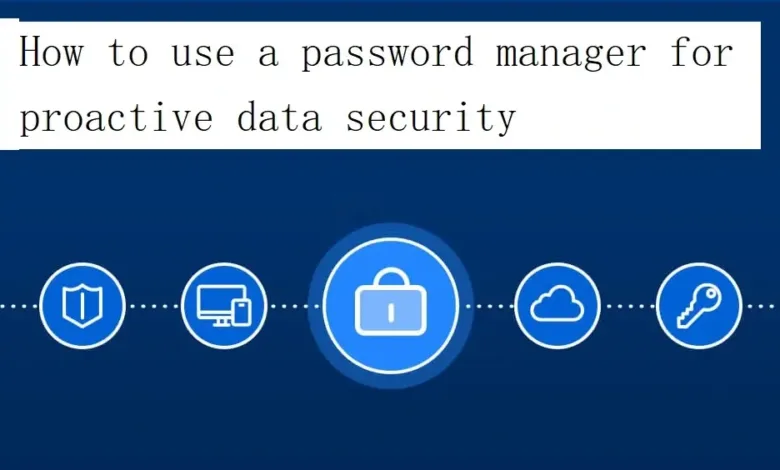How To Use A Password Manager For Proactive Data Security?

Keeping record of your online passwords is a major concern these days. Almost every single activity you do on the browser except the basic web browsing needs a login. Most people prefer simple passwords, while others use one complex password across all of their accounts.
Both of these could be troublesome as they make it easier for the criminals and thieves to attain your credentials. Hence, using a password manager is a much better approach – but what is it? How does it work? Is it really safe? This article answers it all.
What is a Password Manager?
It is a software which helps users to create strong, unique passwords for them. It then saves them in a digital vault protected under a single master password. The users can retrieve this data while logging into their accounts.
Do you need a Password Manager?
There’s a growing concern related to a frequent increase in the number of password leaks. When a website is hacked, the criminals gain access to all of the user’s credentials, including usernames and passwords. If hackers obtain your login information, they can use it on other websites too. In case you’re using the same passwords for many websites, a data leak of one website could give hackers access to all of your online accounts.
A solution to this would be using unique and strong passwords for different websites. An ideal password contains at least 12 characters, preferably more. It also is a combination of numbers, symbols and both upper and lower-case letters. You ideally need to exclude easily guessable information about you such as your birthdate or the names of your family members.
Today, many of us contain numerous online accounts. A 2020 study indicated that each individual has approximately 100 accounts on an average. Hence, it becomes difficult to remember the long, complex passwords. This highlights the need for password managers. They make the process easier by creating random, strong passwords for you and storing them in the system so you don’t need to memorize them. Eventually, the only password you need to memorize is the one for the password manager.
What is the function of a Password Manager?
There are multiple password managers available in the market today. After selecting the best one for you, set it up and secure it with a master password. You’ll save each of your passwords at a single place – i.e digital vault and your master key will be the access to that.
As the master password protects your vault’s crucial information, hence you must choose it wisely. Be careful with its security, if you lose it, you’ll have to reset the passwords for all of your accounts. Some top password managers also offer fingerprint or face ID authentication for mobile devices.
Once you install the password manager, it will ask you to save your passwords and usernames. After that it will preserve them in the digital vallet anytime you log into an app or a website. A robust password manager maintains track of any adjustments made to the data inside the vault. Moreover, it suggests to update the information stored for the website or app. Many password managers provide an autofill, which fills out the login credentials itself whenever you visit the particular pages.
The autofill function not just saves time but alerts you against phishing websites. Let’s say you’re browsing through your normal banking site but the form doesn’t fill your credentials automatically. That could be an indication that you’re at a phishing website with a different URL, possibly using a typosquatting domain.
Besides saving your password information, many managers store your personal data including your address, name and credit card details. This reduces the time for transactions while shopping online. A smart password manager also records your documents, medical records, and photos in a protected vault that you only could access.
Moreover, a password manager suggests you some strong new passwords each time you’re creating new accounts. Hence, it saves your time to create new passwords. A top notch password manager not only advises you about the weak passwords but guides you whenever your data gets breached.
Users could increase their data security by setting up a multi-factor authentication (MFA) for their accounts. MFA represents that protecting your password manager requires one more factor in addition to a master key. This could be a fingerprint, a hardware security key, a face recognition, or a code delivered to a phone authenticator app.
After enabling the multi-factor authentication, you can install the browser extension to make the password manager easy to use. A decent password manager provides extensions for the popular browsers.
How safe are Password Managers?
Knowing that the information they possess, such as your personal information and your login credentials, it’s fair to wonder how safe password managers are, and whether they are secure or not.
Certain password managers could be hacked. But there’s a warning under such conditions, which is, the information held within your password manager must be secured. Suppose your password manager is using Advanced Encryption Standards (EAS), which is a standard industry encryption, it’s quite impossible for the criminals to decode your credentials. Although every password manager provides different features, we may generalize that password managers are safe to use.
The password managers neither store nor access the master password or the protected information in your password database. This adds up an extra layer to the data safety.
How to Choose a Password Manager?
Here’s what you can do to select the best password manager for you:
- Choose a software with a powerful encryption policy.
- Look for a lockout feature, which helps in case you forget your password.
- Develop a backup strategy. Be prepared to comprehend how the dealer will assist you if something goes wrong.
- Verify that the software provides identity theft protection and it provides the way to cope with other malicious activities.
- Get familiar with your software. Analyze the functionality of any password manager you are considering, and make sure it can be integrated with the devices you normally use.
- Determine the pros and cons. A full-featured management software certainly yields the best value for you, but you can download some free password managers as a trial to test according to your desires.
Let’s talk about browser-based password managers. Some web browsers include built-in password managers. However, they’re not as strong compared to the dedicated password managers. That is because they save the passwords on your computer in an unencrypted form. Which means that people can access your credentials unless you encrypt your device’s hard drive. Moreover, some web based password managers don’t offer to create random passwords, and they might prevent cross-platform syncing.
FAQs
How Does a Password Manager Work?
Here are some facts related to its functions:
- It saves all of your data in a digital encrypted vault.
- A password manager takes away the struggle to memorize your password details.
- It provides an autofill function to enter the appropriate details itself whenever you’re browsing across different websites.
What is the need of a Password Manager?
Even though it’s advised to use one strong, unique password for every website you log in. Yet, many of us have different passwords, making it difficult to remember them. Password managers ease this problem by generating and storing passwords for you. Now, the only thing you need to remember is the master key and you can have access to all of your credentials.
How secure are cloud-based Password Managers?
Many cybersecurity professionals prefer cloud-based password managers. According to them, they provide the most secure, as well as, the safest way to store and use the data. A password manager that uses an AES-256 encryption, or military-grade encryption, is nearly impossible to break. A decent password manager should follow the zero-knowledge principle. This means that neither the software programmer nor anyone else should have any knowledge of your data. Regardless of the type of password manager you have, stop using it on public networks since your data can still be intercepted at any time.
Parting words
Password managers, when used regularly, give you the most accurate solution for protecting your sensitive information. You can find numerous password managers available on the web today. Spend some time testing different managers so that you can select the best one for you. A top-notch password manager surely helps you protect the data.





